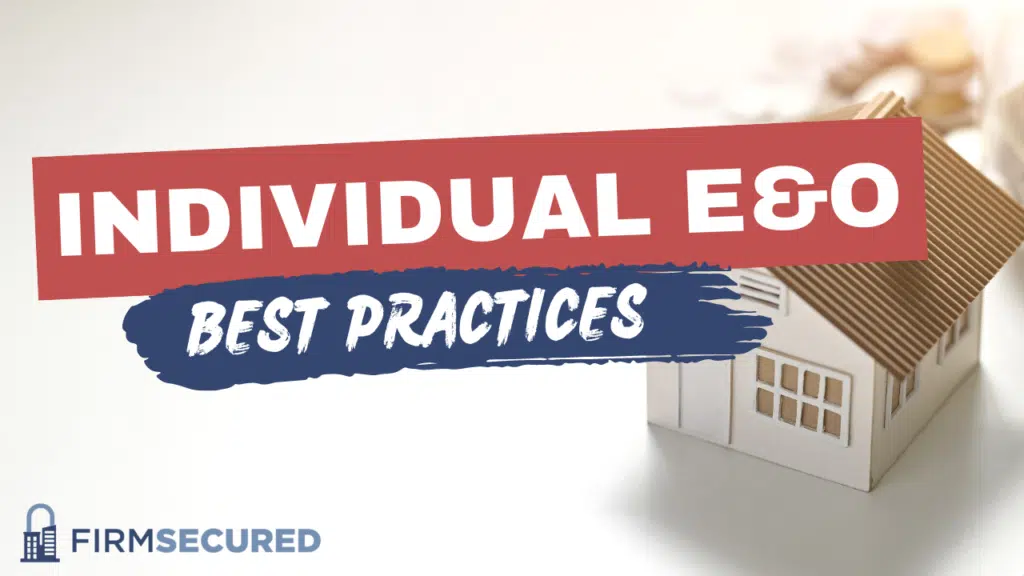Real estate brokers and agents in mandatory states for real estate E&O insurance generally have the options of carrying a firm E&O policy, individual policies for each agent, or/and an excess policy. We break down the differences between these policies more fully in this blog.
If you or your real estate agency has spoken with me or our team about E&O, chances are we discussed the benefits of a single “firm” E&O policy for your brokerage & agents.
For various reasons, whether it be price, not the right time, (etc.) some agencies might choose to have their agents renew individual real estate E&O policies with the state program or their individual E&O provider for the next term.
Consider these best practices when renewing with an individual E&O insurance policy for the next year.
If you first want an even more broad and detailed look at real estate E and O insurance, our Ultimate Guide to Real Estate E&O might be a good start.
Individual Errors & Omissions (E&O) Endorsements
When you renew your policy, carefully consider the endorsement options for additional coverage. Definitely add endorsements for property management, agent-owned transactions, appraisals, and other services you might add throughout the year.
If you are a broker, encourage your agents to consider which endorsements they might need. Many agents simply renew a basic policy for the lowest price without considering their professional liability exposures.
Below are some common add-ons that you might see on your individual real estate E&O (usually for additional premium).
- Contingent Bodily Injury and Property Damage (BI/PD)
- Property Management
- Developed/Constructed by a Spouse
- Appraisal
- Personal Interest/Agent-Owned Property
- Conformity to Other Mandatory E&O States
- Increased limits
- Increased sublimits
Which Individual E&O Endorsements Do You Need?
Contingent Bodily Injury & Property Damage Coverage (BI/PD)
When you are showing a property, if someone is injured (falling on stairs, dog bite, etc.) allegedly because of your professional services, most general liability policies and individual E&O policies both exclude that claim.
This is an example of a contingent bodily injury or property damage claim. If you want coverage, you likely need to purchase the endorsement on your E&O.
Property Management E&O Coverage
If you are a property manager & someone sues for property damage or bodily injury (falling because of a faulty railing installed, etc.), most individual real estate E&O property management endorsements do not include coverage for this form of a property management claim. So definitely consider also adding bodily injury & property damage (BI/PD) coverage endorsement in addition to any property management endorsements. Just be aware that many endorsements for BI/PD only include thousands of dollars of coverage–not your full policy limit.
Personal Interest | Agent-Owned Properties
When selling or purchasing property as an agent in which you have an ownership interest, know that many individual real estate professional liability policies exclude these transactions. Be sure to purchase any relevant personal interest or agent-owned property endorsements available. Know that coverage for the sale of agent-owned raw land or commercial property might not be available. If you are purchasing property as an agent, coverage also might not be available even with personal interest endorsements.
Many personal interest coverage endorsements contain lengthy parameters or conditions specifying various conditions an agent must have record of in order to have coverage for a given transaction. Familiarize yourself with this policy language before selling or purchasing property you own, especially flips. The likelihood of being sued for these transactions is much higher than for a traditional real estate transaction.
Developed/Constructed by Spouse
Finally, if you are selling property that you developed or constructed, or your spouse / a related business entity, know that you likely need to purchase this endorsement on your individual E & O policy. Do note, that many Developed/Constructed by Spouse endorsements exclude coverage when the agent is involved in development or construction, or if they have an ownership interest in the property! The same is likely true if the agent owned part of the construction company that developed the property. Just be very careful and read the exclusions in this endorsement.
Know if Your Agency has an Excess Policy
When real estate agents have individual E&O policies, many brokerages will purchase an excess E&O policy.
If your firm does, this means that if the underlying individual policy limits are exhausted, the excess policy will kick in.
Generally speaking, you want your individual E&O policy to be issued from the same insurance company as your firm’s excess policy. If they are different companies, you might not have coverage under your firm’s excess policy if your policy limits were to be exhausted.
Do note, if an individual agent doesn’t have a given endorsement and a claim arises for that issue, the excess policy will generally not respond either. This is one more reason why brokers should make sure their agents have the necessary endorsements.
Consider Increased Liability Limits
If you firm does not have an excess policy, there are a couple of other insurance companies that offer individual policies that may offer broader coverage. You might consider one of those other companies in that case.
Most individual real estate errors & omissions companies offer coverage endorsements that, if chosen, increase limits. If you currently have $100k limits but regularly selling homes valued above that, you might want to consider purchasing increased limits.
Many real estate E&O policies have sublimits for certain categories of claims. For example, a policy might provide only $5,000 for an escrow or discrimination claim, rather than the full limits of the policy. Lock box, open house, fair housing/discrimination, escrow, bodily injury & property damage, regulatory complaints, and environmental claims often have lower sublimits of coverage. If your E&O company offers increased sublimits for these categories, it is definitely an endorsement worth considering.
Properly Report Claims
Many agents often try to handle claims themselves before reporting them to their E&O insurance carrier. Failure to abide by the reporting requirements for claims is by far the most common reason why real estate errors and omissions claims are denied!
Keep a few things in mind:
Do not attempt to settle a claim yourself—if it escalates into a big lawsuit, the insurance company can deny it for failure to report within the specified timeframe.
When not sure if a situation is a claim, talk to your principal or managing broker, or call your insurance company/agency.
Claims are usually much broader than just lawsuits. Threats, demands, etc. often qualify as claims under the policies reporting requirements..
Tail Coverage | Extended Reporting Period (ERP)
If you leave your current firm and join an agency with a firm E&O policy, keep in mind that you will likely need to purchase extended reporting period ‘tail coverage’ ERP from your current real estate errors & omissions insurance provider.
Firm policies generally provide coverage for transactions done on behalf of the firm that the policy covers, not other agencies under which agents may have previously performed transactions.
Typically, pricing for ‘tail coverage’ is based on a percentage of premium—usually between 100-300% of annual premium, depending on how many years of tail coverage you purchase. This allows you to report claims that might arise later from transactions you conducted while you had your individual real estate E&O policy. A firm policy might provide retroactive coverage or prior acts coverage for transactions performed on behalf of that firm, but generally not for transactions you did for a different firm.









